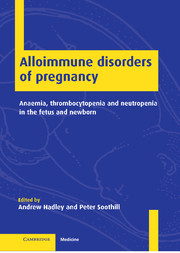 Alloimmune Disorders of Pregnancy
Alloimmune Disorders of Pregnancy Book contents
- Frontmatter
- Contents
- List of contributors
- Preface
- Foreword
- List of abbreviations
- 1 Pathophysiology of the alloimmune cytopenias
- 2 Blood group antibodies in haemolytic disease of the fetus and newborn
- 3 Basis and practice of screening for haemolytic disease of the fetus and newborn
- 4 Epidemiology and screening for alloimmune thrombocytopenia
- 5 Principles of antibody-mediated immune suppression and the prevention of maternal RhD alloimmunization
- 6 The clinical application of anti-D prophylaxis
- 7 Fetal genotyping
- 8 Laboratory assays to determine the severity of haemolytic disease of the fetus and newborn
- 9 Assessing the severity of haemolytic disease of the fetus and newborn: clinical aspects
- 10 Antenatal therapy for haemolytic disease of the fetus and newborn
- 11 Neonatal therapy for haemolytic disease of the newborn
- 12 The diagnosis of alloimmune thrombocytopenia
- 13 The immunological diagnosis of alloimmune neutropenia
- 14 Fetal and neonatal treatment of alloimmune thrombocytopenia
- Index
12 - The diagnosis of alloimmune thrombocytopenia
Published online by Cambridge University Press: 26 October 2009
- Frontmatter
- Contents
- List of contributors
- Preface
- Foreword
- List of abbreviations
- 1 Pathophysiology of the alloimmune cytopenias
- 2 Blood group antibodies in haemolytic disease of the fetus and newborn
- 3 Basis and practice of screening for haemolytic disease of the fetus and newborn
- 4 Epidemiology and screening for alloimmune thrombocytopenia
- 5 Principles of antibody-mediated immune suppression and the prevention of maternal RhD alloimmunization
- 6 The clinical application of anti-D prophylaxis
- 7 Fetal genotyping
- 8 Laboratory assays to determine the severity of haemolytic disease of the fetus and newborn
- 9 Assessing the severity of haemolytic disease of the fetus and newborn: clinical aspects
- 10 Antenatal therapy for haemolytic disease of the fetus and newborn
- 11 Neonatal therapy for haemolytic disease of the newborn
- 12 The diagnosis of alloimmune thrombocytopenia
- 13 The immunological diagnosis of alloimmune neutropenia
- 14 Fetal and neonatal treatment of alloimmune thrombocytopenia
- Index
Summary
Clinical aspects of diagnosis
Alloimmune thrombocytopenia is caused by maternal antibodies which cross the placenta and bring about the immune destruction of fetal platelets (Section 1.1.3 and 1.3.3). The syndrome occurs in about one in 1500 births (Section 4.2). Fetal alloimmune thrombocytopenia may start early in pregnancy. There is no spontaneous remission of thrombocytopenia in utero and, in the absence of therapy, platelet counts usually fall as gestation progresses. Almost 50% of affected fetuses have a platelet count of less than 20 × 109/1. In the absence of screening programmes, alloimmune thrombocytopenia is usually recognized at birth when the majority of affected cases have petechiae, purpura or overt bleeding. Approximately 28% of these affected infants show evidence of central nervous system haemorrhage and up to one-half of these haemorrhages occur prenatally. In utero intracranial haemorrhages may be associated with severe neurological sequelae, porencephaly and optic hypoplasia.
Clinically, alloimmune thrombocytopenia is a diagnosis of exclusion. Typically, infants have no signs of disseminated intravascular coagulation, infection or congenital anomalies – each of which may be associated with thrombocytopenia. Typically, the mother has no history of autoimmune disease, thrombocytopenia or ingestion of drugs which may cause thrombocytopenia – since any of these would suggest a different diagnosis. At delivery, standard laboratory tests show that the neonatal platelet count is low (Section 12.4.1), and the haemoglobin concentration may be low if bleeding has occurred. Maternal platelet counts are normal; this distinguishes alloimmune thrombocytopenia from fetal thrombocytopenia associated with maternal autoimmune thrombocytopenia.
- Type
- Chapter
- Information
- Alloimmune Disorders of PregnancyAnaemia, Thrombocytopenia and Neutropenia in the Fetus and Newborn, pp. 219 - 234Publisher: Cambridge University PressPrint publication year: 2001


